| |||||
| Decades: | |||||
|---|---|---|---|---|---|
| See also: | Other events of 2010 List of years in Kuwait Timeline of Kuwaiti history | ||||
The following lists events that happened during 2010 in Kuwait .
| |||||
| Decades: | |||||
|---|---|---|---|---|---|
| See also: | Other events of 2010 List of years in Kuwait Timeline of Kuwaiti history | ||||
The following lists events that happened during 2010 in Kuwait .

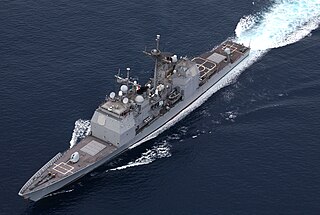
The Aegis Combat System is an American integrated naval weapons system, which uses computers and radars to track and guide weapons to destroy enemy targets. It was developed by the Missile and Surface Radar Division of RCA, and it is now produced by Lockheed Martin.
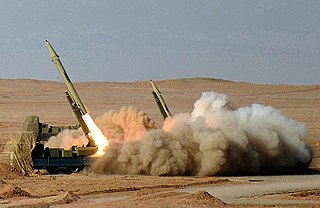
The Fateh-110, also known as NP-110 is an Iranian solid-fueled surface-to-surface ballistic missile produced by Iran's Aerospace Industries Organization since 2002. It is single-stage, road-mobile and can carry a high-explosive warhead of up to 500 kg. Four different versions, the Fateh-110A, 110B, 110D-1 and Fateh-E Mobin were developed with varying accuracy. The latest version, first shown to the public in August 2018 reportedly has a range of 300 km is reportedly more accurate than previous versions.
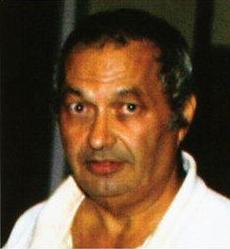
Noshir Sheriarji Gowadia is a former design engineer and convicted spy for several countries. He was arrested in 2005 and later convicted on industrial espionage-related federal charges.

WikiLeaks is a non-profit media organisation and publisher of leaked documents. It is funded by donations and media partnerships. It has published classified documents and other media provided by anonymous sources. It was founded in 2006 by Julian Assange. Kristinn Hrafnsson is its editor-in-chief. Its website states that it has released more than ten million documents and associated analyses. WikiLeaks' most recent publication of original documents was in 2019 and its most recent publication was in 2021. From November 2022, numerous documents on the organisation's website became inaccessible. In 2023, Assange said that WikiLeaks is no longer able to publish due to his imprisonment and the effect that US government surveillance and WikiLeaks' funding restrictions were having on potential whistleblowers.
On 11 January 2007, China conducted an anti-satellite missile test. A Chinese weather satellite—the FY-1C polar orbit satellite of the Fengyun series, at an altitude of 865 kilometres (537 mi), with a mass of 750 kilograms (1,650 lb)—was destroyed by a kinetic kill vehicle traveling with a speed of 8 km/s (18,000 mph) in the opposite direction. It was launched with a multistage solid-fuel missile from Xichang Satellite Launch Center or nearby.

The Houthi movement, officially known as Ansar Allah, is a Shia Islamist political and military organization that emerged from Yemen in the 1990s. It is predominantly made up of Zaidi Shias, with their namesake leadership being drawn largely from the Houthi tribe.
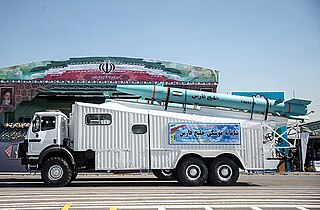
An anti-ship ballistic missile (ASBM) is a military ballistic missile system designed to hit a warship at sea.
The Afghan War documents leak, also called the Afghan War Diary, is a collection of internal U.S. military logs of the War in Afghanistan, which was published by WikiLeaks on 25 July 2010. The logs consist of over 91,000 Afghan War documents, covering the period between January 2004 and December 2009. Most of the documents are classified secret. As of 28 July 2010, only 75,000 of the documents have been released to the public, a move which WikiLeaks says is "part of a harm minimization process demanded by [the] source". Prior to releasing the initial 75,000 documents, WikiLeaks made the logs available to The Guardian, The New York Times and Der Spiegel in its German and English online edition, which published reports in line with an agreement made earlier the same day, 25 July 2010.
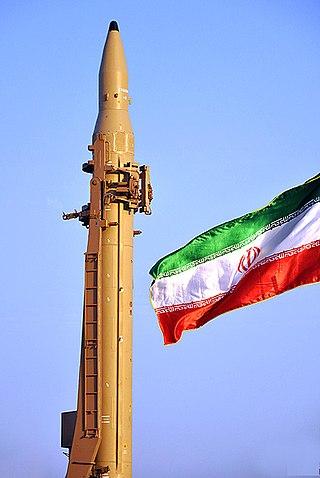
The Qiam 1 is a short-range ballistic missile designed and built by Iran. It was developed from the Iranian Shahab-2, a licensed copy of the North Korean Hwasong-6, all of which are versions of the Soviet Scud-C missile. The Qiam 1 entered service in 2010, with a range of 800 km (500 mi) and 100 m (330 ft) (CEP) accuracy.
The United States diplomatic cables leak, widely known as Cablegate, began on Sunday, 28 November 2010 when WikiLeaks began releasing classified cables that had been sent to the U.S. State Department by 274 of its consulates, embassies, and diplomatic missions around the world. Dated between December 1966 and February 2010, the cables contain diplomatic analysis from world leaders, and the diplomats' assessment of host countries and their officials.
Content from the United States diplomatic cables leak has depicted the United States' opinion of the Middle East-related subjects extensively. WikiLeaks has published these classified documents, diplomatic cables, between the United States Department of State and its diplomatic missions around the world. Many previously unknown statements or opinions about a variety of Middle Eastern topics have been revealed.
Contents of the United States diplomatic cables leak has depicted Europe and related subjects extensively. The leak, which began on 28 November 2010, occurred when the website of WikiLeaks—an international new media non-profit organisation that publishes submissions of otherwise unavailable documents from anonymous news sources and news leaks—started to publish classified documents of detailed correspondence—diplomatic cables—between the United States Department of State and its diplomatic missions around the world.
Content from the United States diplomatic cables leak has depicted Iran and related subjects extensively. The leak, which began on 28 November 2010, occurred when the website of WikiLeaks—an international new media non-profit organisation that publishes submissions of otherwise unavailable documents from anonymous news sources and news leaks—started to publish classified documents of detailed correspondence—diplomatic cables—between the United States Department of State and its diplomatic missions around the world.
Content from the United States diplomatic cables leak has depicted Saudi Arabia and related subjects extensively. The leak, which began on 28 November 2010, occurred when the website of WikiLeaks — an international new media non-profit organization that publishes submissions of otherwise unavailable documents from anonymous news sources and news leaks — started to publish classified documents of detailed correspondence — diplomatic cables — between the United States Department of State and its diplomatic missions around the world. Since the initial release date, WikiLeaks is releasing further documents every day.
Content from the United States diplomatic cables leak has depicted Asia and Oceania subjects extensively. The leak, which began on 28 November 2010, occurred when the website of WikiLeaks — an international new media non-profit organisation that publishes submissions of otherwise unavailable documents from anonymous news sources and news leaks — started to publish classified documents of detailed correspondence — diplomatic cables — between the United States Department of State and its diplomatic missions around the world. Since the initial release date, WikiLeaks is releasing further documents every day.
Events in the year 2012 in the Islamic Republic of Iran.
WikiLeaks began publishing emails leaked from strategic intelligence company Stratfor on 27 February 2012 under the title Global Intelligence Files. By July 2014, WikiLeaks had published 5,543,061 Stratfor emails. Wikileaks partnered with more than 25 world media organisations, including Rolling Stone, L’Espresso and The Hindu to analyse the documents.
The following lists events that happened during 2011 in Kuwait.
The timeline of the Gulf War details the dates of the major events of the 1990–1991 war. It began with the Iraqi invasion of Kuwait on 2 August 1990 and ended with the Liberation of Kuwait by Coalition forces. Iraq subsequently agreed to the United Nations' demands on 28 February 1991. The ground war officially concluded with the signing of the armistice on 11 April 1991. However, the official end to Operation Desert Storm did not occur until sometime between 1996 - 1998. Major events in the aftermath include anti-Saddam Hussein uprisings in Iraq, massacres against the Kurds by the regime, Iraq formally recognizing the sovereignty of Kuwait in 1994, and eventually ending its cooperation with the United Nations Special Commission in 1998.

The Joint Comprehensive Plan of Action, commonly known as the Iran nuclear deal or Iran deal, is an agreement on the Iranian nuclear program reached in Vienna on 14 July 2015 between Iran, the P5+1, and the European Union.